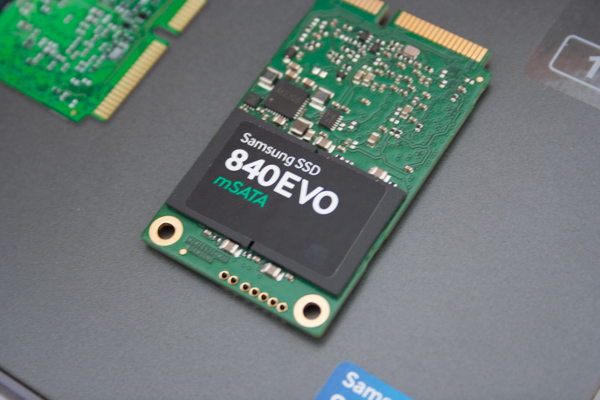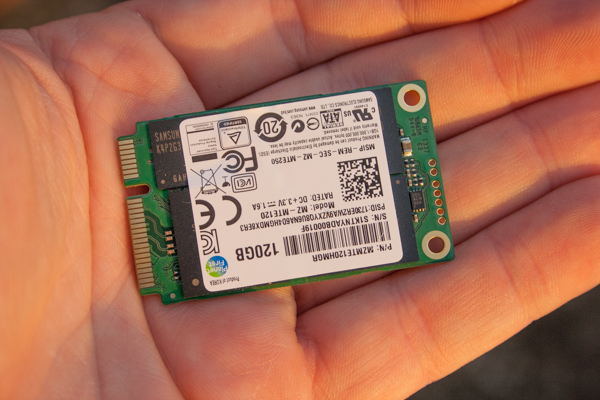Samsung 840 EVO mSATA Review: 120, 250, 500, And 1000 GB, Tested
Once upon a time, adopting mSATA-based storage meant compromising capacity and performance. With its 840 EVO, Samsung gives you access to as much as 1000 GB at incredibly fast speeds. The company even manages attractive pricing to keep mSATA competitive.
Samsung's 840 EVO Shrinks; Gives Up Very Little
Last summer, we got our hands on Samsung's 840 EVO and tested, and tested, and tested. There were some new technologies in play, some of which had a big impact on the benchmarks we were running. But once we wrapped our heads around the performance numbers, we conceded that the 840 EVO was a compelling piece of hardware, triple-level cell NAND and all.
The drive's performance was about as high as we could expect, given a SATA 6Gb/s interface. And now that Samsung has eDrive/TCG Opal 2.0 support working, security coverage is impeccable as well. Add RAPID caching software on top of the firmware's Turbo Write technology, and the performance story only got better. We concluded our coverage with a look at Samsung's comprehensive SSD management software, which I still think is the most feature-packed package of its kind. As a bonus, Samsung includes its own cloning utility (though I've had mixed results with that). By the end of our review, we had found a lot to like. The 840 EVO was (and still is) an impressive mainstream offering. But what really pushed us over the edge was availability of a 1 TB model, which joined Crucial's M500 as an affordable 1 TB-class option for enthusiasts.
Now that Samsung is putting its 840 EVO platform to work on the mSATA interface (even the improbable 1000 GB model), we see more of the same. This is good news for the growing crop of devices able to take mSATA-based SSDs to save space. Once upon a time, compatible devices were smaller, slower, and a lot more expensive. But we just saw that you don't have to give anything up in terms of capacity or performance. There is still a price premium in play, but the smaller form factor offers certain other benefits to help compensate. And you'll definitely come in under the $1/GB mark.
Sure, the retail mSATA market is fairly nichey. But Samsung's competition should at least be nervous. This company has a track record of disrupting the markets it enters; now that it's focusing attention on smaller form factors with enthusiast-class hardware, it's only a matter of time before we start seeing M.2-based offerings as well.
The 1 TB 840 EVO in mSATA trim is a decidedly important component, given the lack of high-capacity options in that small form factor. Only a handful of 512 GB-class mSATA-based SSDs exist, and good luck finding anything larger. Not only does Samsung push everything that's good about its 840 EVO into a compact form factor, but it does so using four NAND packages and excellent power consumption characteristics.
I actually think that the 500 GB model is even more attractive. It's performance is equal to or better than the 1 TB SSD, and of course it's more affordable. The 256 GB version takes a small step back in the benchmark charts, but it remains in distinguished company. Even the disadvantaged 120 GB drive handles itself as well as can be expected. It's at least among the other mainstream 128 GB-class offerings (with generally-better read performance).
Understandably, the high-capacity 840 EVOs are feathers in Samsung's hat. The more pedestrian models are arguably more meaningful, since they're what most of us can afford. On those SSDs, Turbo Write kicks in to help counter the limitations of triple-level cell NAND. Read speeds match almost any other SATA 6Gb/s-capable drive out there, and the emulated SLC cache helps augment write performance, too.
Get Tom's Hardware's best news and in-depth reviews, straight to your inbox.
After a page of reflecting on the 840 EVO's positive qualities, it's worth mentioning that there isn't much critical we can say. Crucial's M500 is the most relevant contender, and where the M500 gives up some performance, a bit of capacity, and some fancy extras, it also wields NAND redundancy and more robust power resiliency. The two competing line-ups offer accelerated eDrive and TCG Opal 2.0 security, while the M500 technically benefits from two-bit-per-cell NAND.
It's a tough choice that only gets easier if you're looking at the top capacity point; Crucial doesn't have its 960 GB M500 available in mSATA form yet. We suspect storage enthusiasts will go around in circles trying to pick a favorite until something shiner shows up. What we can say is that your mSATA-based choices continue getting better. Really, Samsung's 840 EVO is a great representation of the interface done right. It's worthy of consideration as you look to populate the tiny slot on your notebook or small form factor desktop, to be sure.
Current page: Samsung's 840 EVO Shrinks; Gives Up Very Little
Prev Page TRIM Testing: How Much Does The 840 EVO Benefit?-
blackmagnum Maybe it's time to upgrade the HD of an old working notebook to SSD! But will a Core2Duo processor bottleneck a SSD?Reply -
jrharbort @blackmagnum: You don't have to worry about your processor being a bottleneck, but rather, your system's SATA interface. It is highly doubtful that your Core 2-based notebook (much like my own) has an m-sata slot, and the 2.5" bay for a HDD would have a SATAII port, not SATAIII. So the overall max read/write rates would be cut in half. But to answer your question in another way, tom's posted an article almost a year ago on the subject of upgrading older systems with an SSD: http://www.tomshardware.com/reviews/ssd-upgrade-sata-3gbps,3469.htmlReply -
spookyman @blackmagnum: You be glad to upgrade your hard drive to a SSD drive. Did it for my goddaughter's after she had a hard drive crash and it runs a lot faster then before.Reply -
JohnnyLucky Interesting article. It coincides with the current shift from desktop pc's to mobile pc's.Reply -
pyro226 "The latest version offers RAPID support to non-EVO drives like the 840 Pro."Got my hopes up there. The standard 840 series SSDs are NOT supported. The article didn't explicitly state they were, but what other drives (aside from the 840 Pro and EVO) have Rapid support? Perhaps "The latest version offers RAPID support to both EVO and 840 Pro SSDs." would be more accurate.Reply -
LordConrad "This company has a track record of disrupting the markets it enters; now that it's focusing attention on smaller form factors with enthusiast-class hardware, it's only a matter of time before we start seeing M.2-based offerings as well."This is mainstream hardware, I don't know any enthusiats who will settle for drives with TLC NAND.Reply -
lowguppy It is nice to see these finally available. I've been watching the Crucial m500 mSATA drive for a while, and the 480gb version frequently falls under $300 on NewEgg, which is competitive with 2.5" SSDs.Reply -
RedJaron Reply
"Enthusiast" to me doesn't automatically mean getting the fastest, biggest, bestest, craziest parts regardless of price. It also means people who put a lot more thought into their systems and thoroughly weigh all their options. MLC, TLC, or not, the fact remains that the EVO is a fast, reliable drive for a good price.12750948 said:This is mainstream hardware, I don't know any enthusiats who will settle for drives with TLC NAND.
Your argument sounds similar to, "I don't know any enthusiasts who will settle for LGA 1150 instead of LGA 2011," or "I don't know any enthusiasts that would settle for a non-K CPU."

